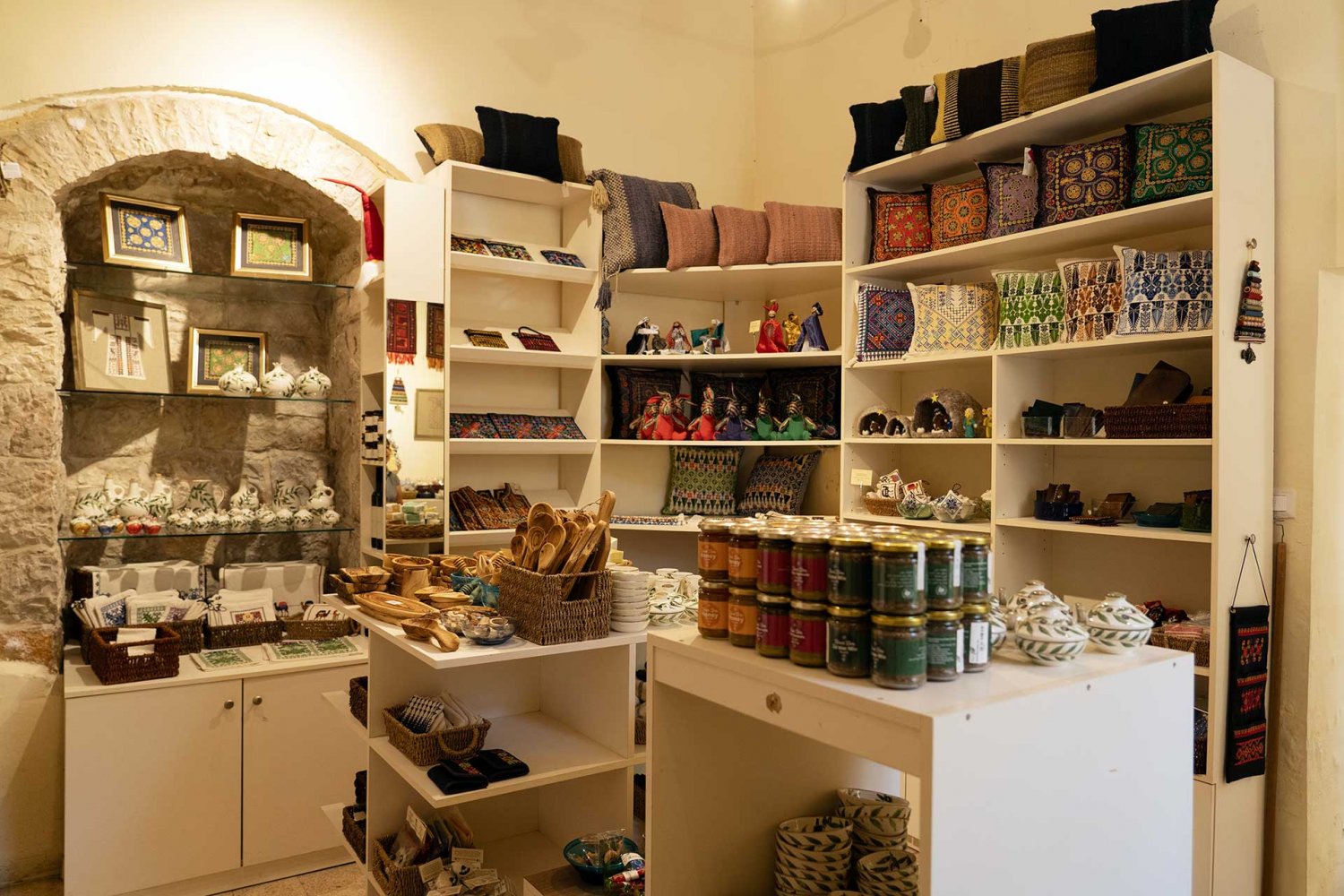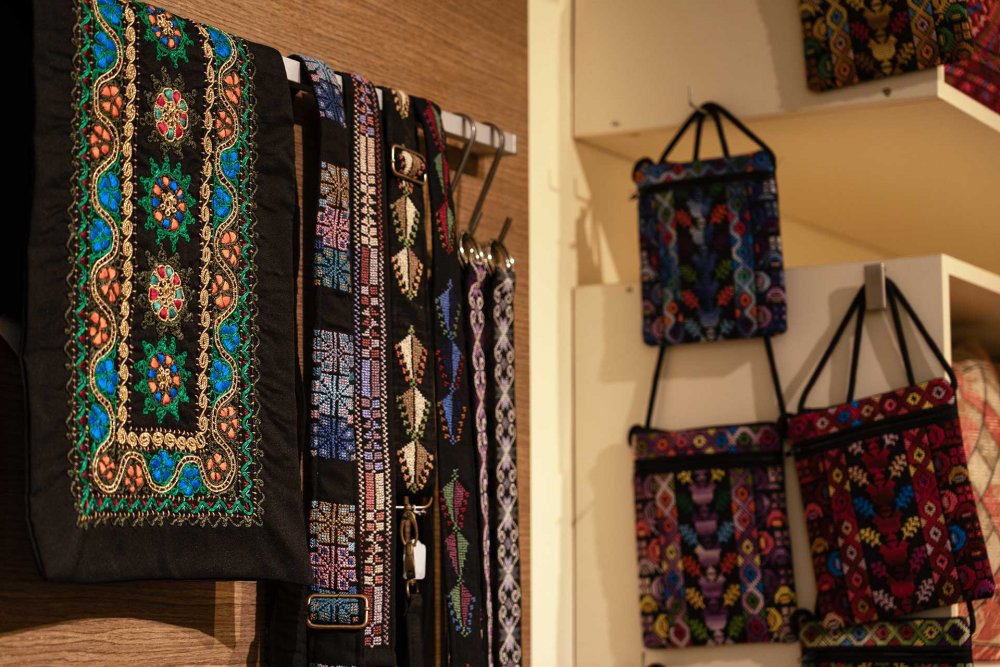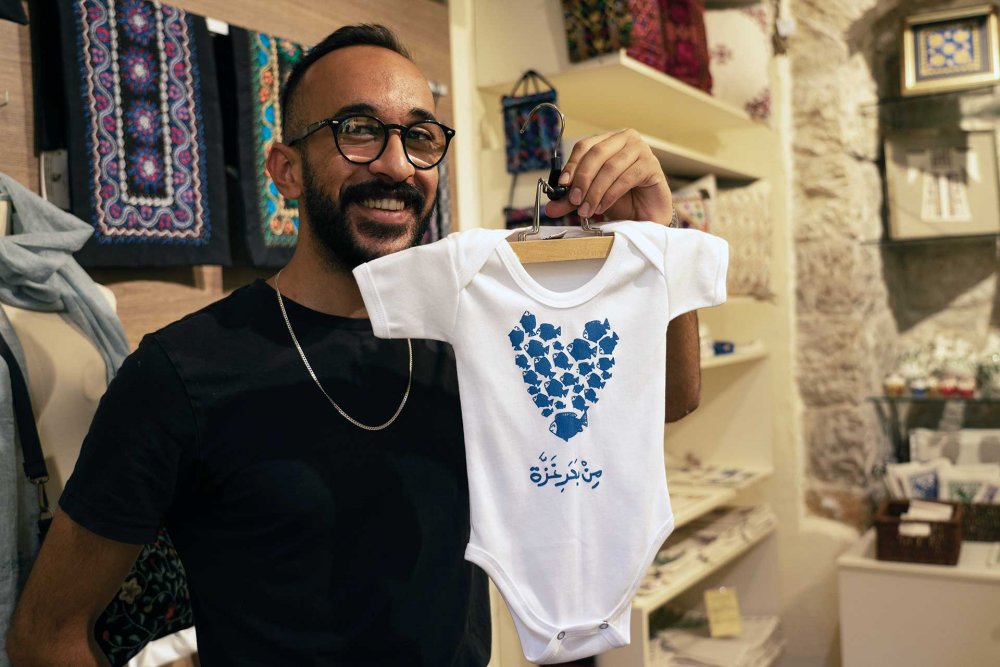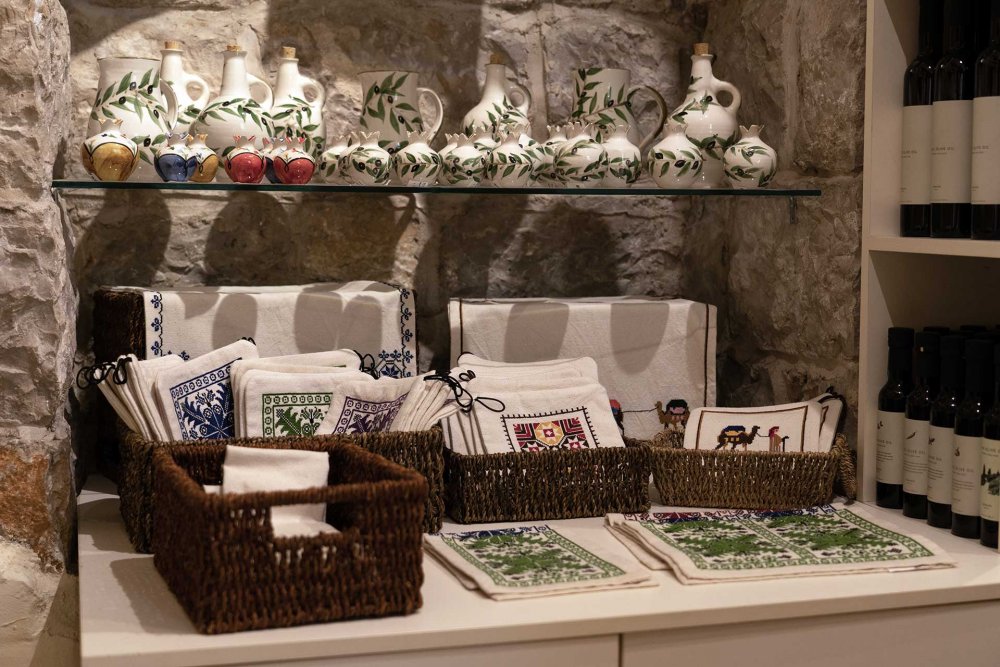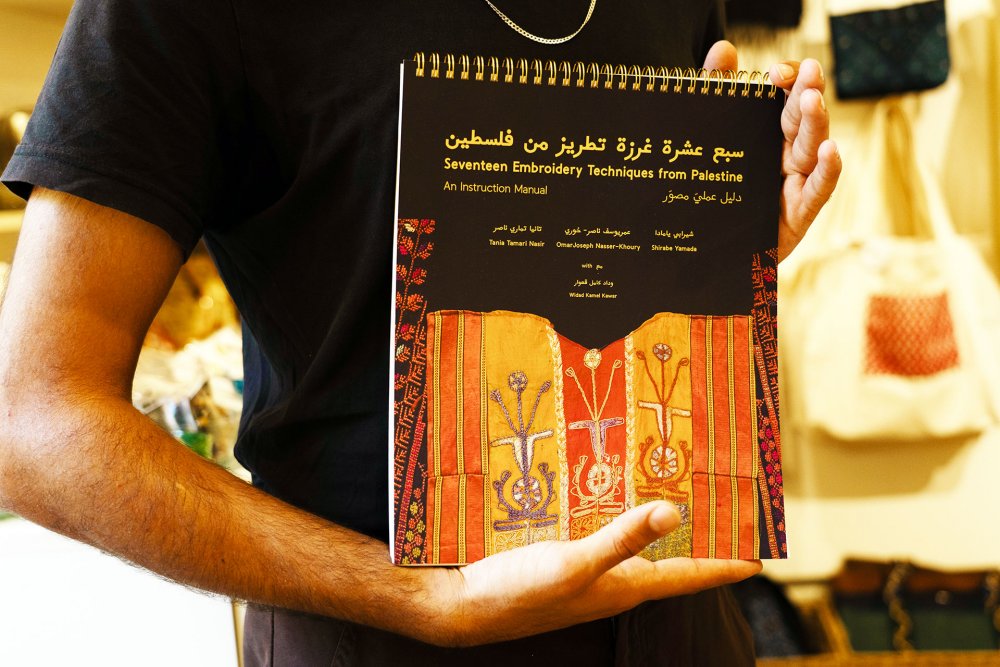Introduction
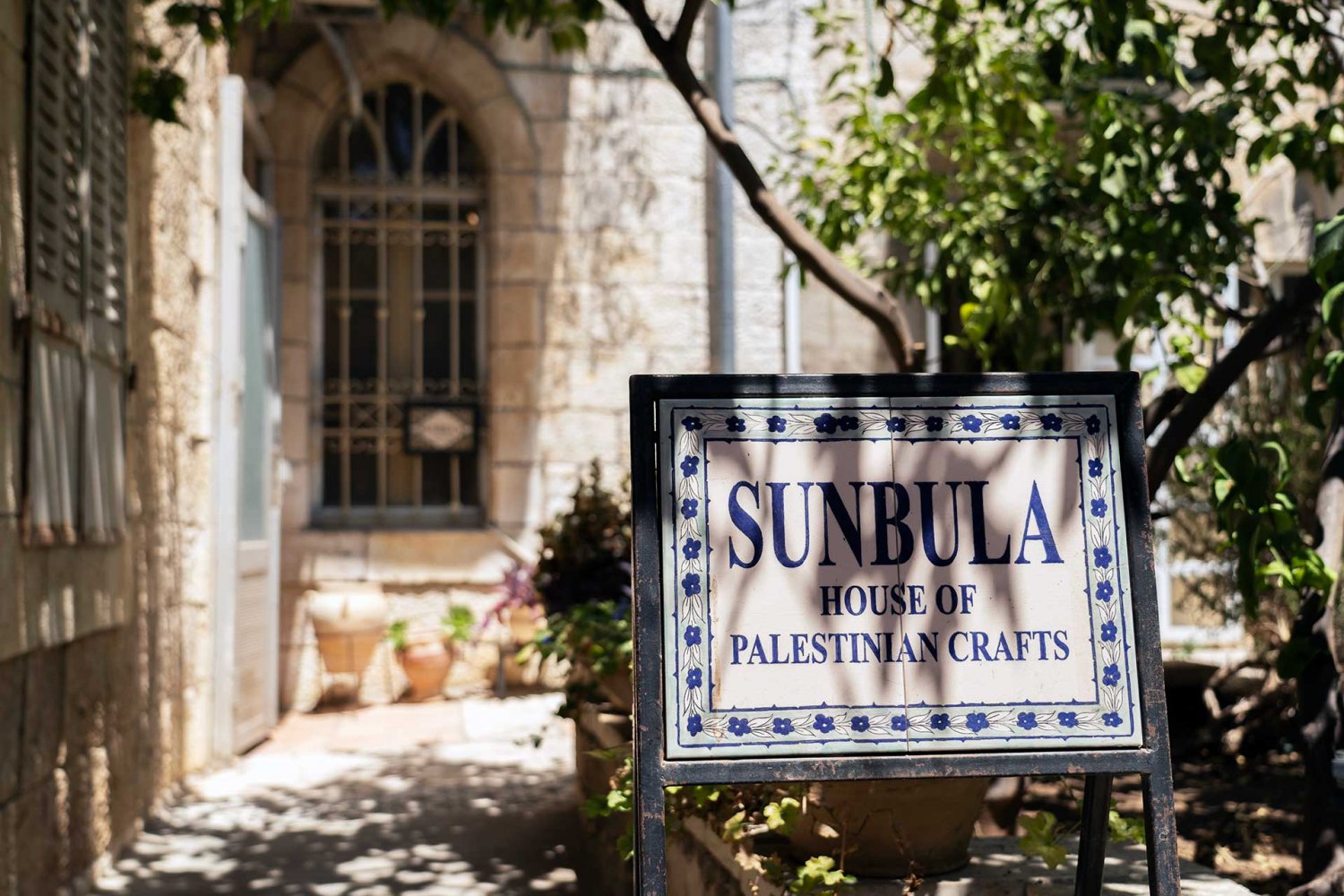
Credit:
Mays Shkerat for Jerusalem Story
Sunbula: The Fair-Trade Crafts Store Connecting Palestine to the World
You can find just about anything at Jerusalem’s Sunbula House of Palestinian Crafts, from hand-painted dinner sets, embroidered pillowcases, and tote bags, to key chains, traditional Palestinian dresses, and custom-designed baby grows. The handicraft store, which opened in April 2010, features a sunny courtyard with tables and chairs, and everyone who visits is happy to engage in a conversation, curious to learn about the stories behind each of the items displayed.
Sunbula sits on Nablus Road in Jerusalem’s Sheikh Jarrah neighborhood, not far from the Ambassador Hotel and right under the Sabreen Association of Artistic Development. It is a place for Palestinian craftsmanship to shine by empowering its makers and sharing the region’s traditional techniques and products with the world.
Origins
Sunbula’s story began in 1988 during the First Intifada when Carol Morton, the wife of the late Reverend Colin Morton of the St. Andrew’s Scots Memorial Church in Jerusalem, launched a project called “Craftaid.” She set up a small craft shop in the St. Andrew’s Guesthouse and invited local makers to sell their wares. The project was such a success that it continued and was eventually registered as an official business in 1996 under the name Sunbula (a female Arabic name that translates to “a spike of wheat symbolizing a source of life”).
Since then, Sunbula has operated as a nonprofit fair-trade organization. (Fair trade means a way of buying and selling goods that ensures the producers get a fair price.) The Sunbula team currently works with 25 local artisan groups from communities across Gaza, the West Bank (including East Jerusalem), and within Israel’s borders, and they ship their wares all around the world with strong customer bases in Canada, the United States, and the United Kingdom. In fact, 40 percent of their revenue comes from international orders.
The team includes one part-time shopworker, one part-time accountant, and an executive director. They source their designers through word of mouth and work closely with the artisan groups to train them and help design their wares if needed. Although the shop is a strong source of income, it doesn’t cover all their costs, so they regularly apply for grants and funds to sustain the initiative.
The Impact of the War on Gaza
When Israel launched its war on Gaza in October 2023, Sunbula experienced a drop in footfall because of evacuation orders. However, they so were inundated with e-commerce orders from around the world that it was difficult to keep up, especially as they were unable to receive additional stock from their artisans in Gaza.
Being in Jerusalem is a strategic choice. Here, the store has far more visitors than in other areas of Palestine, and because the crafts are labor intensive and fair trade, they’re expensive for low-income consumers elsewhere in the West Bank and Gaza. Having a shop in East Jerusalem means Sunbula has access to tourists as well as employees at embassies, NGOs, and consulates.
Today, Sunbula is the only Palestinian fair-trade organization in Jerusalem. It is also the only place where people can find handmade crafts from farflung Palestinian communities. “This is a link between Jerusalem and the rest of Palestine,” the director says.
Meeting Exceptional Challenges
The ongoing war in Gaza has had a negative impact on business in Jerusalem. It’s become harder to access communities in the rest of the West Bank due to checkpoints and road closures, and repeated sieges on Palestinian towns, camps, and cities means the artisans aren’t always able to complete their orders. It’s becoming more difficult for women in West Bank villages to access nearby cities for materials, and settler violence frequently disrupts their work.
The director points to tote bags and headbands that hang in clusters on the wall. “These products are produced by Noor Al-Qamar, new partners of ours in Jerusalem who are on the other side of the wall,” she says. “They’re a Bedouin community based in a town called ‘Anata close to the Mount of Olives and the Hebrew University campus. But they’re surrounded by a military base, the Separation Wall, and a new road built for the settlers.”
The community used to be seminomadic, but now they’re confined to a small space in Area C where they are under constant threat of displacement. Sunbula hosted a sewing workshop for the women and taught them how to stitch, design, and manage a sustainable project.
“The women are so motivated, and the products are doing really well,” the director says. “Before the war, their husbands used to labor in Israel, but now they’re unemployed and suddenly these women who never had prior experience are the breadwinners in the family.”
Staying Motivated
Despite these challenges, Sunbula’s team remains passionate about its mission. Shaden Abed-elal has been working at Sunbula for close to two years. “This is not office work. You’re always in the field,”1 he says. “It’s gratifying to work with beautiful things and be part of the process and enrich lives.”
Sitting in the sunny courtyard outside the shop, Shaden explains that in the north of Israel, where he’s from, crafts and embroidery are considered frivolous hobbies rather than a serious source of income. But his mindset shifted when he moved to Jerusalem to study communication and graphic design at Bezalel Academy of Arts and Design. That’s where he discovered a completely different side to art. “Now, I have a passion for Palestinian embroidery,” he says.
Shaden joined Sunbula as a shopworker but soon became involved with building communities, connecting with artisans, and even designing their wares.
“Each city has its own variation of embroidery and motifs,” he says. “An oak tree or a Cyprus tree will look different depending on the town or city. I like to explain and teach people what the embroidery means and how it reflects the politics and power dynamics of the home.”
Shaden explains how sewing their own clothes helps empower women. “For example, they can sew a pocket into their dress that will hide their money and other important stuff,” he says.
Embroidery also acts as a form of self-expression: a woman will wear different patterns that vary depending on whether she’s a widow, a single woman, or a woman without children. “With time, I started to learn that embroidery is something that can unfold women’s stories and the struggles they’ve been through,” Shaden says. “It’s my mission to tell people that embroidery is not just a product that we sell. It has meaning, and it’s part of a tradition that we need to appreciate.”
That’s why, each time a customer purchases something at Sunbula, the team includes a card with more detailed information about the item.
Oasis Center Project
Since joining the team, Shaden has been involved with multiple projects across Palestine. In March 2023, he teamed up with the Oasis Center in the town of Beit Sahur near Bethlehem. The organization aims to support adults with disabilities and help them integrate into Palestinian society. As soon as Shaden walked into the Oasis office, he felt connected by their shared passion for crafts and embroidery. “For them, crafts are a profession,” Shaden says. “We connected about what craft means to us, and I helped them come up with designs.”
They discussed the motifs that best symbolized their culture, how they want to express themselves, and how to share the energy of their village with others. They all agreed that fish would be an excellent symbol of expression as fish represent fertility and wealth and have strong connotations in Gaza. Once the team designed the garments, they were then produced in one of the few surviving textile factories in Bethlehem.
Since Sunbula is a fair-trade organization, the team wanted to understand how long each garment took to produce in order to price it fairly. “But it was really hard to capture, because the artisans’ time is very fluid,” Shaden says. “They told me that they take a piece and do it while waiting for the meat to cook, and then when waiting for the kids to come home, and then while sitting with the neighbors.”
So, they decided to price each garment according to how much thread was used rather than how much time it took to create.
Creating a Legacy
One of the reasons Shaden loves his work is because of the connection he builds with the customers. “We always have a cute conversation about Palestine, and it really makes my day,” he says. “Women using embroidery to express themselves is something that we need to tell people about. These items have a meaning and there’s strength to it.”
To keep the understanding and tradition alive, Sunbula published a book in 2019 that includes instructions for the different dress-making techniques in Palestine. In early September, Seventeen Embroidery Techniques from Palestine: An Instruction Manual was re-released in a second edition due to popular demand. The book entailed extensive field research, with numerous Palestinian women embroiderers fanning out to the elderly in their community and videotaping their testimonies about their stitching.
In a blog post written on September 11, 2024, upon the new edition’s release, the Sunbula team wrote:
the release of this second edition carries huge significance. Published amidst the ongoing genocide in Gaza, it serves as a crucial effort and reminder to protect and preserve Palestinian cultural heritage. Home to generations of highly skilled craftspeople who have kept alive traditional crafts like embroidery, weaving, pottery, and woodwork, Gazans now face unprecedented challenges. Tragically, two of Sunbula’s partner organizations in Gaza—Sulafa Embroidery Centre and Atfaluna Crafts [through the Crafts Production Unit at the Atfaluna Society for Deaf Children]—have been destroyed, with their staff and artisans displaced. In light of these circumstances, this second edition emphasizes the importance of teaching these embroidery techniques to future Palestinian generations, strengthening the sustainability of this rich cultural tradition.2
The book is available at Sunbula House of Palestinian Crafts flagship store in Jerusalem, and from Sunbula’s online shop.
Now, Palestinians in the diaspora are forming embroidery circles using those techniques, preserving the craft and staying connected to their culture.
Understandably, the funders’ priorities have shifted since the war on Gaza began but, in the future, the Sunbula team hopes to expand its space. Sunbula is currently limited to a small shop, but a bigger space will mean it can empower more initiatives, hire more staff, and expand its product range. “We’d love to have furniture and home interior items,” the director says.
Ultimately, it’s impossible to underestimate the value of organizations like Sunbula. They pay homage to the cultural diversity of Palestine, while empowering its people and keeping legacies and traditions alive.
Notes
Director of Sunbula, interview by the author, August 21, 2024. All subsequent quotes from the director are from this interview.
Shaden Abed-elal, interview by the author, August 21, 2024. All subsequent quotes from Abdel-elal are from this interview.
“Timeless Stitches: Unveiling the 2nd Edition of 17 Palestinian Embroidery Techniques,” Sunbula (blog), September 11, 2024.


